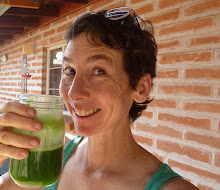
Tashi Delek!
Recently, I've been learning all I can about the Kingdom of Bhutan, called 'Druk Yul' in Dzongkha, the national language. I've been reading the national newspaper, the Kuensel on-line. Why, you may ask, am I interested in Bhutan, one of the hippest tourist destinations for the jetsetting Western eco-Buddhist set? Well....it's not 'cause I'm a jetsetter. As a student of Buddhism, an adventurer, and a teacher of English as a second language, I would love to teach English and live for a time in a land which operates according to Buddhist principles. So, I am going to explore this feeling I have to visit Druk Yul.
In Bhutan, Gross National Happiness (GNH) is a core value, considered much more important than the conventional indicator of a nation's [economic] well-being, Gross National Product (GNP). GNH includes well-being, cultural preservation, environmental conservation, and self-reliance for the Kingdom of Bhutan. GNH is a much talked about value inside (and outside) Bhutan--the term itself was coined by the present King of Bhutan, Jigme Singye Wangchuk--and a question on the national census asks, 'are you happy?'
What kind of 'data' will the government glean from answers to that question? From my perspective, a country that designs policies that value the emotional, spiritual, and physical well-being of its' land, animals, air, water, and citizens more than the 'more-is-better' economic development model with its' goal of increased productivity and per capita income that destroys the earth and living beings can ask me that question, simplistic as it seems.
The articles on GNH that I've read address the historical background of Bhutan, the difference in western and non-western economic views, the question of quantification (i.e., how is GNH measured?), and, what exactly does the GNP measure anyway? In the USA, for example, we produce millions of cars and build lots of buildings and highways and things, all GNP indicators, but the GNP does not reflect all that we destroy in the process: air and water quality, trees and other vegetation, animals, human cultures who coexist with the land, and the life events and artifacts that emerge from all of this. The GNP also does not consider all the unpaid acts and volunteer labor that support a society.
If you are curious to know more about GNH, click on the following links http://www.bhutanstudies.org.bt
http://www.globalideasbank.org/site/bank/idea.php?ideaId=3257
For info on the second international conference on Gross National Happiness held last week in Nova Scotia, see:
http://www.gpiatlantic.org/conference/index.htm
Click here to download "Gross National Happiness: Towards Buddhist Economics", a paper written by former international banker, Sander G. Tideman.
Oh - here is another interesting fact: His Majesty the King has four wives.
**Tashi Delek! = a traditional Tibetan greeting which means 'Welcome!' and/or 'Good fortune'.

No comments:
Post a Comment